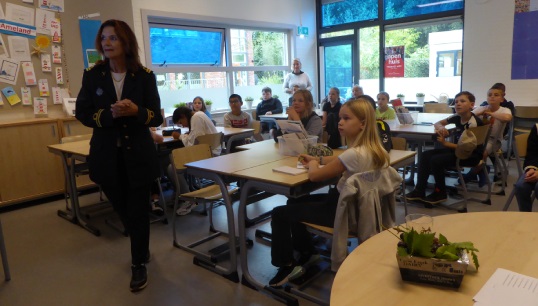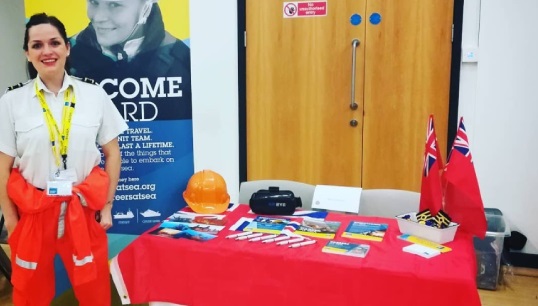- Topics
- Campaigning
- Careers
- Colleges
- Community
- Education and training
- Environment
- Equality
- Federation
- General secretary message
- Government
- Health and safety
- History
- Industrial
- International
- Law
- Members at work
- Nautilus news
- Nautilus partnerships
- Netherlands
- Open days
- Opinion
- Organising
- Podcasts from Nautilus
- Sponsored content
- Switzerland
- Technology
- Ukraine
- United Kingdom
- Welfare

If your new year's resolution was to spread the word about maritime careers, the good news is that you won't have to do it on your own. Here are some maritime career promotion schemes in the UK and Netherlands that you can join, and the stories of Nautilus members who have taken part
Zeebenen in de Klas (Sea Legs in the Classroom)
Organiser: The Seafarers Labor Market Task Force (TAZ), which is a partnership of Nautilus International, the Royal Association of Dutch Shipowners (KVNR), Dutch Pilotage Service and the Dutch Association of Merchant Navy Captains. It is financed by the Maritime Shipping Training and Development Fund
How it works: Zeebenen in de Klas aims to interest Year 7 and 8 students in the seafaring profession, under the motto: 'A ship's captain belongs in the same category as a pilot or a firefighter'. Volunteers go into the classroom to give a presentation about their own career at sea, and answer questions from students.
The project has been successfully running since September 2010, and even took place virtually during the Covid-19 lockdowns
Who takes part: Many Nautilus members. New ambassadors (masters, mates, pilots and engineers) are always welcome
Support offered: The various organisations involved in the project have created a range of presentations and other materials that volunteers can use during school visits
Case study – skipper Henderika de Vries: I have been a classroom ambassador for over six years, and I still really like it – it’s a lot of fun.
My recent visit to De Triangel Primary School saw enthusiastic participation from students. I described my own life and career, from being 'born' on my parents' inland vessel to becoming a skipper, obtaining my navigator's diploma at the Enkhuizen nautical school, and voyaging to Scandinavia.
Then I took the students through some fun exercises to get their imaginations working. In one, I got the students to all stand with their legs apart and asked the classmates to push each other. Most of them stayed standing – they have 'sea legs'! Tablets were then distributed and the students gained insight into features of seafaring work such as the AIS system.
Finally, the students received a branded pencil case, compass and pen as a memento. Their positive feedback included: 'Very interesting', 'It’s nice that you can do things yourself', 'I actually didn't know much about it', 'Maybe I will also go to nautical school', 'I think I also want to go to sea.'
More info and contacts:
Zeebenen in de Klas website
zeebenenindeklas@gmail.com
STEM Ambassadors

Organiser: STEM Learning, which is supported by the UK government, industry and professional institutions such as the institute of Mechanical Engineers
How it works: The programme has a website and mobile app where schools and community groups can post requests for ambassadors with details of what type of event is happening and what they need the ambassador to do.
Ambassadors can search by local area and activity type and express an interest. Events can range from practical activities such as building wind turbines and racers, to subject choice discussions and careers talks
Who takes part: Anyone who works in the fields of science, technology, engineering or maths can sign up with STEM Learning. There is also an enhanced programme for members of the Institute of Mechanical Engineering
Support offered: STEM Learning arranges and pays for the DBS/PVG criminal record checks and certification when ambassadors sign up, but in common with the other schemes on these pages, does not pay for travel and subsistence expenses. Training and ongoing personal support are provided
Case study – engineer officer Allan Dickson: My last event was as a volunteer at a week-long careers hive organised by Edinburgh Science and hosted at the National Museum of Scotland in Edinburgh. In total, 33 schools sent over 2,500 students to the event.
I attended for one of the days, which was the minimum requirement to take part. As volunteers, all we needed to do was use the activity we were at to talk to students. My activity was on power generation, with several hand powered generators that could be connected to different loads such as a radio or disco ball to see how different components made generating power easier or harder.
Although the activities were interesting and fun, they were designed to help break the ice and get students talking rather than to be a lesson or a task to complete. Discussions with students included whether I knew what I wanted to do when I was at school, how much I got paid and what was a day like at my work. I had previously received training on having these conversations and how to relate my job to students.
It was rewarding to help students realise that not knowing what they wanted to do is not a bad thing. That a career isn't for ever; you can change careers and that doing so doesn’t mean you wasted anything, or failed.
More info and contacts:
STEM Ambassadors website
enquiries@stem.org.uk
Careers at Sea Ambassadors

Organiser: UK Merchant Navy Training Board
How it works: Seafarers or ex-seafarers sign up to become Careers at Sea Ambassadors, and then schools or youth groups (e.g. Sea Cadets) can request a visit from an ambassador for whatever career event they are hosting.
Weekly emails are sent out to the ambassadors listing the events that require ambassadors to attend, with their event type, date and location. A connection will then be made between the school's/group's contact and the ambassador prior to the event
Who takes part: Essentially anyone within the maritime industry. However, given that the primary focus is to inform the students of the various roles you can do at sea, it is advantageous if ambassadors are serving seafarers, or have been seafarers prior to coming ashore
Support offered: The scheme provides information and resources to help ambassadors deliver a fun and engaging talk, as well as promotional brochures, and merchandise to give away such as branded pens. Travel and subsistence expenses are not paid, but ambassadors are encouraged to choose local schools and youth groups to keep costs down
Case study – deck officer Heather Enness: I have been to numerous careers fairs over the years, but my last event was actually mock interviews for a school in Warwick. I often get given students who have shown an interest in a career in engineering, but who don’t know which kind, so naturally I suggest that they look at being a marine engineer and send them away with leaflets and maybe even a goody or two.
Here in the Midlands a lot of people have never even heard of the Merchant Navy, so it is an incredible feeling when you see the glint in a student's eyes when they have just learnt about this new potential career prospect. It is in that moment that you realise that you may well have just changed the course of someone's life.
And it is for that exact reason why I love being a Careers at Sea Ambassador and wholeheartedly recommend it. Even if it's just one event a year, I promise you will not be disappointed
More info and contacts:
Careers at Sea Ambassadors website
Inspiring the Future Maritime
Organiser: Maritime UK in partnership with Inspiring the Future
How it works: The scheme aims to connect volunteers from the maritime sector with young people in the classroom. Young people engage with a diverse range of career role models from the maritime sector via in-school or virtual activities.
Inspiring the Future Maritime is run along the same lines as Careers at Sea Ambassadors, and for a time the two schemes were merged, but they are now being run as two separate entities again.
To join the scheme, you fill in an online form. You can express interest in virtual and in-person activities and accept or decline invitations for activities based on your availability. Volunteers receive an email whenever a school invites them to an activity
Who takes part: All kinds of maritime professionals, but if you are in a shore-based role, this scheme may suit you better than Careers at Sea Ambassadors
Support offered: Resources are available on the website to help volunteers to prepare materials such as PowerPoint presentations for their talks
Case study: An ambassador working in the subsea sector shares her experiences as a volunteer on the Inspiring the Future Maritime website
More info and contacts:
Inspiring the Future Maritime website
Shruthi Sivadasan's experience as a volunteer
Tags
More articles
Seeing sea careers in National Careers Week
Maritime careers are very much in the spotlight as UK National Careers Week 2020 gathers pace today.
Mapping a Merchant Navy career with the Careers at Sea Ambassadors
New campaign aims to inspire girls to choose maritime and STEM careers
Maritime UK and its Women in Maritime Taskforce have joined forces with Women in Science and Engineering to share a new digital resource aimed at inspiring the next generation of young women
